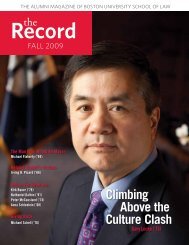the nature of representation: the cherokee right ... - Boston University
the nature of representation: the cherokee right ... - Boston University
the nature of representation: the cherokee right ... - Boston University
You also want an ePaper? Increase the reach of your titles
YUMPU automatically turns print PDFs into web optimized ePapers that Google loves.
2005] THE NATURE OF REPRESENTATION 95<br />
embassy <strong>of</strong> mischief,” 12 working incessantly to help create “[s]ympathy for <strong>the</strong><br />
underdog.” 13 Responding to arguments that removal benefited Indians, Ross wrote,<br />
“it is with deep regret and great diffidence we are constrained to say that in this<br />
scheme <strong>of</strong> Indian removal we can see more <strong>of</strong> expediency and policy to get rid <strong>of</strong><br />
<strong>the</strong>m than to perpetuate <strong>the</strong>ir race upon any fundamental principle.” 14 Ross’s many<br />
communications to <strong>the</strong> U.S. government ultimately failed to prevent Cherokee<br />
removal, but his efforts can be credited in part with helping raise <strong>the</strong> awareness <strong>of</strong><br />
<strong>the</strong> great wrong being done to <strong>the</strong> Cherokees through forced removal. In a telling<br />
critique <strong>of</strong> removal for <strong>the</strong> National Intelligencer, Jeremiah Evarts was arguably<br />
correct in asserting, “[h]istory furnishes no parallel case <strong>of</strong> palpable injustice and<br />
cruelty, committed, or allowed, by <strong>the</strong> mass <strong>of</strong> <strong>the</strong> inhabitants <strong>of</strong> a great country,<br />
after ample time for deliberation.” 15<br />
A. Role <strong>of</strong> Treaty Negotiation in Removal<br />
The attention Cherokees brought to <strong>the</strong>ir plight encouraged <strong>the</strong> U.S. government<br />
to continue its practice <strong>of</strong> using treaties ra<strong>the</strong>r than force alone to facilitate Cherokee<br />
removal. “[T]he unwillingness <strong>of</strong> government <strong>of</strong>ficials to adhere to <strong>the</strong>ir own<br />
ethics and written laws” went only so far. 16 For while <strong>the</strong> Jackson administration<br />
felt comfortable not respecting <strong>the</strong> Cherokee’s existing treaty <strong>right</strong>s to <strong>the</strong> security<br />
<strong>of</strong> <strong>the</strong>ir land in Georgia and Tennessee, <strong>the</strong> government felt bound to at least secure<br />
removal through a formal treaty. Francis Paul Prucha, an Indian treaty expert,<br />
observes:<br />
Removal was accomplished, not by unrestrained executive action, but through<br />
<strong>the</strong> traditional forms <strong>of</strong> treaties, and those treaties preserved <strong>the</strong> ideas <strong>of</strong> Indian<br />
sovereignty and inviolable land titles, even while <strong>the</strong> Indians were being<br />
forced to abandon <strong>the</strong>ir homelands in <strong>the</strong> sou<strong>the</strong>rn states and seek a new<br />
destiny west <strong>of</strong> <strong>the</strong> Mississippi. 17<br />
Removal and <strong>the</strong> removal treaties are inseparable. Removal cannot be understood<br />
simply by looking at <strong>the</strong> final version <strong>of</strong> <strong>the</strong> treaties used to secure and legitimize<br />
removal and <strong>the</strong> same is true for <strong>the</strong> treaties <strong>the</strong>mselves. Ra<strong>the</strong>r, “an investigation<br />
<strong>of</strong> <strong>the</strong> historical context for each treaty and an understanding <strong>of</strong> <strong>the</strong> culture and<br />
12<br />
Letter from Wilson Lumpkin to Governor <strong>of</strong> Georgia William Schley (Oct. 18,<br />
1836), in 2LUMPKIN, supra note 3, at 54.<br />
13<br />
RALPH HENRY GABRIEL,ELIAS BOUDINOT CHEROKEE &HIS AMERICA 159 (1941).<br />
14<br />
Letter from John Ross, R. Taylor, John F. Baldridge, and Joseph Vann to Lewis<br />
Cass (Feb. 14, 1833), in 1THE PAPERS OF CHIEF JOHN ROSS, 1807-1839, at 261 (Gary E.<br />
Moulton ed., 1985).<br />
15<br />
Jeremiah Evarts, Communication: Present State <strong>of</strong> <strong>the</strong> Indian Question to <strong>the</strong><br />
Editors <strong>of</strong> <strong>the</strong> National Intelligencer (Nov. 24, 1830), in CHEROKEE REMOVAL: THE<br />
“WILLIAM PENN” ESSAYS AND OTHER WRITINGS 281 (Francis Paul Prucha ed., 1981).<br />
16<br />
HOIG, supra note 11, at 3.<br />
17 FRANCIS PAUL PRUCHA, AMERICAN INDIAN TREATIES: THE HISTORY OF A POLITICAL<br />
ANOMALY 167 (1994).









